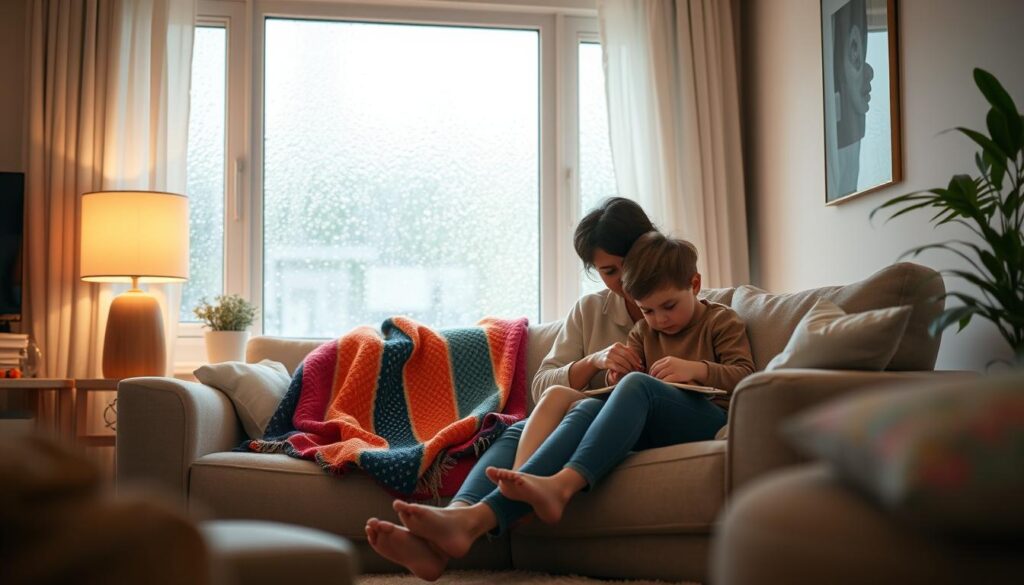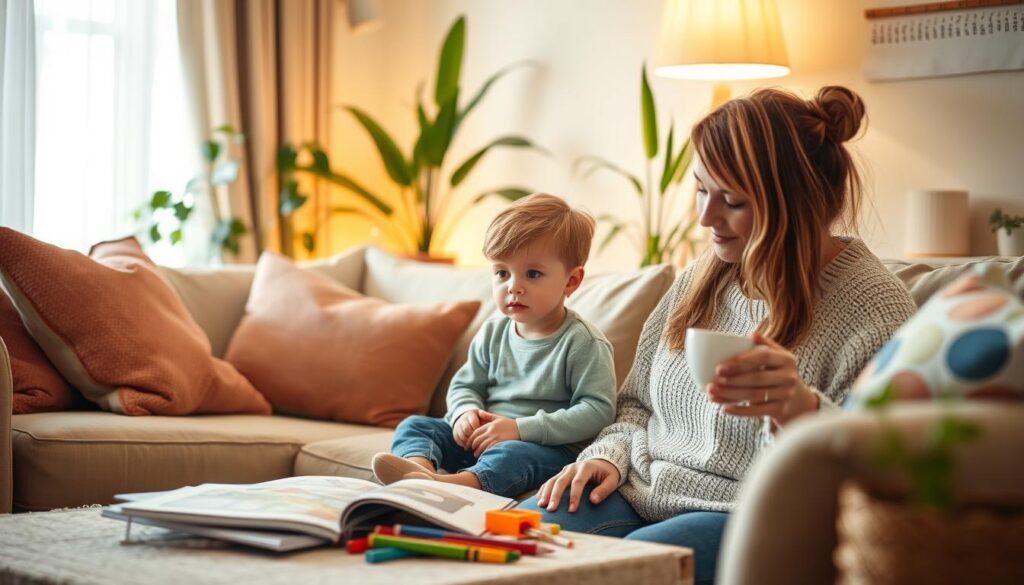Coping Tips for Parents of Depressed Children

As a parent, you are very important in helping your child’s mental health. Many children face depression, and it’s key to know the signs and act fast. Can you spot the early signs of depression in your child and help them feel better?
Helping a sad child needs a big plan. This includes knowing about childhood mental health and finding ways to deal with depression. This guide will give you useful tips and methods to help you support your child’s mental health.
Introduction to Childhood Depression
Depression in children can really affect their daily life. As a parent, knowing the signs and symptoms is very important. By understanding mental health in kids and learning how to support them, you can help your child feel better and live a happier life.
Key Takeaways
- Spotting the early signs of childhood depression is key to helping your child.
- Knowing about childhood mental health is vital for finding good ways to cope.
- Supporting a sad child means talking openly and creating a caring home.
- Dealing with a depressed child is tough, but with the right help, you can guide them through it.
- Depression in kids can really change their life, so getting professional help is important.
- By learning to support a sad child, you can help them find healthy ways to cope and improve their mental health.
Understanding the Signs of Childhood Depression
As a parent, knowing the signs of childhood depression is key. It helps you support your child and manage their condition. Childhood mental health is very important for a child’s well-being. Spotting the signs of childhood depression lets you help your child at home.
Children show depression differently than adults. It’s important to know the unique signs. Look for changes in behavior, physical symptoms, and emotional signs. This knowledge helps you start helping your child with depression.
Behavioral Changes to Watch For
Behavioral changes are a big sign of childhood depression. Your child might pull away from friends, eat or sleep differently, or lose interest in fun activities. They might not want to play with friends or enjoy sports anymore.
Physical Symptoms and Warning Signs
Physical symptoms can also show depression in kids. Look for headaches, stomachaches, or feeling very tired. If your child keeps having these symptoms, see a doctor to check for other health issues.
Emotional Indicators of Depression
Emotional signs like sadness, hopelessness, or being easily upset can mean depression. Create a safe space for your child to talk about their feelings. This support helps them deal with depression and keeps their mental health strong.
The Impact of Your Child’s Depression on Family Dynamics
As a parent, you are very important. You show your child how to behave and support them emotionally. When your child is sad, it can change your whole family. Parenting strategies for depressed children need you to understand how depression affects your family. You must find ways to keep your family loving and supportive.
Helping a sad child can be hard, but it’s very important. By focusing on childhood mental health, you can help your child learn to deal with their sadness. Here are some important things to keep your family healthy:
- Encourage open communication: Make a safe place for your child to share their feelings.
- Foster a sense of empathy: Let your child know their feelings are okay and you’re there to help.
- Develop a support network: Get help from family, friends, or support groups.
By using these parenting strategies for depressed children, you can help your child with their sadness. Remember, supporting a sad child takes patience, understanding, and a focus on childhood mental health. Together, you can help your child get better and do well.
Essential Steps in Coping with a Depressed Child
Being a parent of a depressed child is tough and emotional. It’s key to make a loving space where talking is easy. When you talk to your child, listen well and say their feelings are okay. Make sure you have their full attention.
Getting help from a therapist is also smart. A therapist can help your child find why they’re sad and how to feel better. This way, your child gets the help they need to beat their sadness.
- Creating a supportive home environment that promotes open communication and trust
- Maintaining a consistent daily routine to provide a sense of stability and structure
- Encouraging physical activity and outdoor play to help reduce symptoms of depression
By taking these steps and getting help when you can, you can help your child feel better. Remember, helping a depressed child takes patience, understanding, and support.
| Steps in Coping with a Depressed Child | Benefits |
|---|---|
| Creating a supportive home environment | Promotes open communication and trust |
| Maintaining a consistent daily routine | Provides a sense of stability and structure |
| Encouraging physical activity and outdoor play | Helps reduce symptoms of depression |
Self-Care Strategies for Parents
Helping a depressed child at home can be very hard. It’s key to take care of your own mind and body. This way, you can support your child the best you can.
Self-care is very important for parents. It helps you be strong for your child. You can do things like exercise, meditate, or talk to friends and family. These actions help you feel better and stay positive.
Here are some self-care tips to consider:
- Take breaks and do things that make you happy
- Practice mindfulness and meditation to reduce stress
- Connect with others, such as friends, family, or a support group, to build a network of help and encouragement

By doing these self-care activities, you’ll be ready to help your child. Remember, taking care of yourself is not selfish. It’s important to be a good parent. By focusing on your mental health, you’ll help your child through tough times.
| Self-Care Activity | Benefits |
|---|---|
| Exercise | Reduces stress, improves mood |
| Meditation | Decreases anxiety, increases mindfulness |
| Social Connection | Builds support network, enhances emotional well-being |
Professional Help and Treatment Options
As a parent, knowing when your child needs help with depression is key. Getting child therapy for depression is a big step. It helps your child deal with feelings and find better ways to cope. Look for a therapist who knows how to work with kids and uses good child counseling for depression methods.
There are many therapy types, like one-on-one, group, and family therapy. A therapist can help pick the best treatment for your child. Parenting strategies for depressed children are also important. They help you support your child and create a caring home.
- Cognitive-behavioral therapy (CBT)
- Interpersonal therapy (IPT)
- Psychodynamic therapy
Talking to your child’s school is also key. Tell teachers and counselors about their depression. This way, your child gets the help they need to do well in school and with friends.
| Therapy Type | Description |
|---|---|
| Cognitive-behavioral therapy (CBT) | Helps children identify and change negative thought patterns |
| Interpersonal therapy (IPT) | Focuses on improving relationships and communication skills |
| Psychodynamic therapy | Explores the underlying causes of depression and helps children develop coping mechanisms |
Building a Support Network
As a parent, it’s key to build a support network. This includes other parents, family, and community resources. They offer emotional support, practical help, and connection during tough times.
Having a strong support network is crucial for childhood mental health. Start by connecting with other parents who face similar challenges. You can do this online or in person. It helps you feel less alone and more able to help a depressed child at home.
Connecting with Other Parents
- Join online forums or support groups for parents of children with mental health issues
- Attend parenting workshops or seminars on childhood mental health
- Participate in local community events or activities that promote mental health awareness

Utilizing Community Resources
Community resources offer valuable support and guidance. Reach out to local mental health organizations, schools, or healthcare providers. They can provide information and referrals.
Daily Activities and Routines That Can Help
As a parent, coping with a depressed child means setting up daily routines. These routines help with healthy habits and emotional support. They include a regular sleep schedule, physical activity, and social and emotional activities.
When talking to a depressed child, listen well to their feelings. Ask questions like “How are you feeling today?” or “What’s been on your mind lately?” This helps you understand them better and support them.
Some daily activities that help your child’s mental health include:
- Engaging in physical activities, such as walking or jogging, to release endorphins and improve mood
- Practicing relaxation techniques, such as deep breathing or meditation, to reduce stress and anxiety
- Participating in creative activities, such as drawing or painting, to express emotions and promote self-expression
Adding these activities to your daily routine helps your child develop good habits. Be patient, understanding, and supportive. If you need more help, don’t hesitate to seek professional advice.
Working together and creating a supportive environment helps your child face childhood mental health challenges. It helps them develop the skills and resilience needed to thrive.
| Activity | Benefits |
|---|---|
| Physical activity | Improves mood, reduces stress and anxiety |
| Relaxation techniques | Reduces stress and anxiety, promotes relaxation |
| Creative activities | Expresses emotions, promotes self-expression and confidence |
Conclusion: Moving Forward with Hope and Resilience
Supporting your child through depression is tough. But, you’re not alone. You can help them by focusing on their mental health and finding the right help.
Build a strong support team of family, friends, and mental health experts. They can offer advice and cheer you on. Keep up with routines and activities that help your child feel better. With time, effort, and faith in your child, they can beat depression and find new strength.
Every child’s path is different. Listen to your gut, fight for what’s best for your child, and hold onto hope. You and your child can face this together. You’ll come out stronger, closer, and ready to support your child as they grow.




